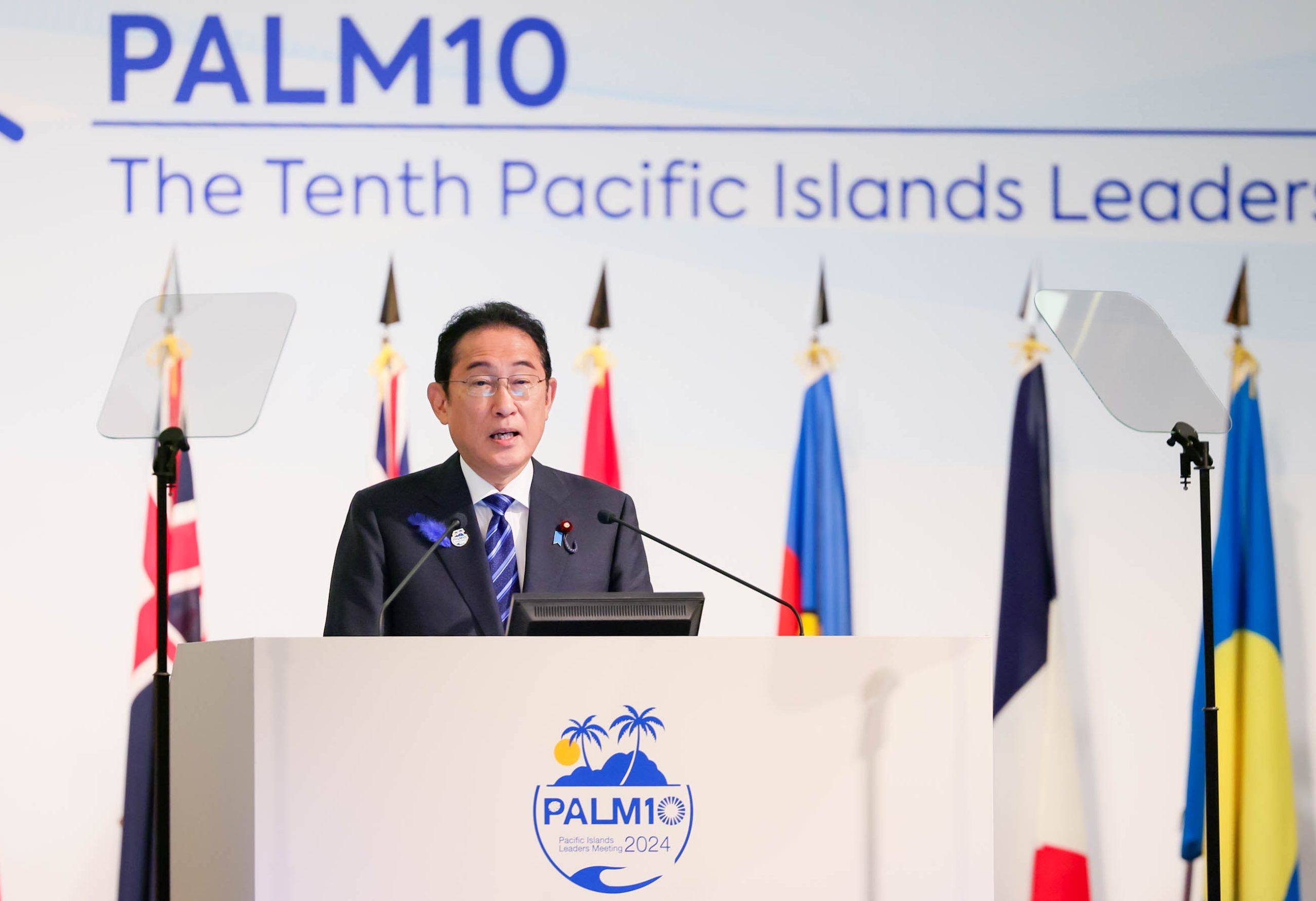Climate change is a real and present danger. The countries and territories of the Pacific are on the front lines.
Across this large and diverse region, natural disasters are on the rise, threatening lives and livelihoods.
Ensuring the safety and wellbeing of citizens will require vision, innovation, and collective action. That is why, when Pacific leaders gathered in Tokyo from July 16 to 18 for the 10th Pacific Islands Leaders Meeting (PALM10), a shared mission to make the region more climate-resilient was at the center of the discussion.
Japan and Pacific Island countries understand the urgency of mitigating and adapting to climate change, and of responding to other crucial issues facing the Pacific region.
The lively and fruitful discussions in Tokyo—which were buttressed by Japanese commitments in areas ranging from disaster risk reduction to maritime security and safety, economic development to cyber security—were a testament to that shared awareness.
“PALM10 can be said to be the culmination of Japan’s long-term cooperation with the countries with which it shares the Pacific Ocean,” said Professor Izumi Kobayashi of Osaka Gakuin University, who has studied Japan’s relations with Pacific Island countries and territories.
“This support has been well received, and from the perspective of the development and maintenance of peace in the Pacific, it’s really a matter of course.”
At PALM10, leaders committed to a partnership built on trust and kizuna—Japanese for deep and lasting bonds. That partnership is underpinned by the Pacific Islands Forum’s 2050 Strategy for the Blue Pacific Continent, a broad vision for the region’s security and well-being that was developed in 2022.
The 2050 Strategy identifies climate change as the number one threat, an understanding that was reiterated by PALM10 leaders including co-host Kishida Fumio, Japan’s prime minister.
A major project announced at the summit, the Pacific Climate Resilience Initiative, will mobilise Japanese financial and technological resources to help Pacific Island countries to strengthen disaster risk reduction and response capabilities and to promote decarbonisation.
The initiative builds on existing Japanese support, such as the country’s cooperation with the Pacific Climate Change Centre (PCCC), established in Samoa in 2019 under a grant aid program. Japan is also helping five countries in the region—Fiji, Tuvalu, Samoa, the Federated States of Micronesia, and Palau — to promote energy transitions by strengthening capacity related to power-supply and grid planning.
Exchanges of people, information, and technology are central to Japan’s approach to supporting Pacific Island countries and territories.
At PALM10, Japan committed to the implementation of people-to-people exchanges and human resource development programs that will benefit more than 6500 people over the next three years.
Such exchanges cover various fields ranging from science and technology to security. For instance, Prime Minister Kishida and Tongan Prime Minister Hu’akavameiliku welcomed Japan’s participation at the International Naval Review, hosted by the Kingdom of Tonga, and the acceptance of cadets from the Tongan armed forces to the National Defense Academy of Japan—a program that also encompasses cadets from Fiji and Papua New Guinea.
Bilateral initiatives complement and support the aims of the PALM process. Japan and Fiji, for instance, signed a Memorandum of Cooperation under which the two countries will explore implementing Japan’s Quasi-Zenith Satellite System (QZSS) “Michibiki” emergency warning and disaster management service in Fiji—a potentially important step in improving Fiji’s climate resilience.
Other initiatives agreed or re-affirmed at PALM10 included the provision of patrol boats to Nauru, fisheries research vessels and equipment to Papua New Guinea, Vanuatu, Federated States of Micronesia, Marshall Islands, and Fiji; Japanese support for the reconstruction of an international airport terminal in the Marshall Islands and a bridge in Palau; a Memorandum of Cooperation to promote trade and investment promotion between Japan and Fiji; and commitments by Japan to support a subsea cable-related project in Tuvalu and the Federated States of Micronesia.
Professor Kobayashi said the commitments made by Japan and its partners at PALM10 “further deepened the mutual trust that has been built up over the past nine PALMs.”
He added that, to maximise the positive impact, Japan and its partners will need to maintain regular communication outside the triennial PALM process and coordinate their efforts with those of other countries that support the region.
Efforts such as these rest on a shared foundation of values and principles. In the Leaders’ Declaration, participants emphasised the primacy of global peace and stability and reaffirmed the importance of freedom, democracy, sustainable development, the rule of law, human rights, human dignity, the peaceful resolution of disputes, and respect for environmental integrity.
They also affirmed the importance of a free and open international rules-based order and recognised that the rights, freedoms, responsibility and sovereignty of all countries, regardless of size or power, are protected by international law, rules and norms.
Shared values such as these have long been on prominent display at the triennial PALM gatherings, the first of which was held in 1997.
The PALM process is one way that Japan is committed, in the words of Prime Minister Kishida, to “stride forward together” with the people of the Blue Pacific.
The Reuters news staff had no role in the production of this content. It was created by Reuters Plus, the brand marketing studio of Reuters. The views expressed in this article do not necessarily reflect the views of this newspaper.



